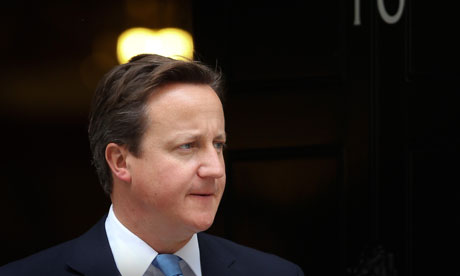Downing Street intends for £215m worth of deals to be done between Russia and the UK when the prime minister visits the Kremlin, despite a warning to David Cameron from four former foreign secretaries that business people already operating in the country are "victims of an increasingly potent mix of corruption and lawlessness".
In advance of Cameron's visit, the first face-to-face contact between a British prime minister and the Russian prime minister, Vladimir Putin, since 2007, No 10 said it hoped to build on trade links between the two countries.
The British government hopes Russia's high level of economic growth, compared with the European average, could help fuel the export-led recovery it is trying to galvanise. If £215m in deals could be struck, 500 British jobs would be created, Downing Street said.
But in a move that makes clear the difficulties of the visit, the former foreign secretaries Margaret Beckett, Jack Straw and David Miliband, who are all Labour, and the Conservative Sir Malcolm Rifkind, have written to the Sunday Times calling on Cameron to raise the issue of the Russian government's treatment of business people, lawyers and journalists with Putin and the president, Dmitry Medvedev.
Their letter says hundreds of thousands of Russian businessmen are detained in jails after falling victim to corruption sanctioned by the authorities.
The PM will need to try to smooth out tensions in the wake of BP's offices being raided, just a day after the firm lost out on a multibillion pound Arctic exploration deal with Rosneft to its American rival, ExxonMobil.
Britain is the sixth largest investor in Russia, with deals worth around £20bn and hundreds of companies working there, but if Cameron is to increase that number he needs the business environment to become more benign.
The exiled Russian tycoon Boris Berezovsky has warned Cameron that his decision to meet Putin is a "historical mistake" that will lead to more bloodshed inside the country. "The longer you speak with the gangster head of a country, the more victims there will be … until these cannibals are erased from the story," Berezovsky said in a telephone interview from London.
This is the first visit to Russia of a British prime minister since the murder of former Russian spy Alexander Litvinenko in 2006.
Russian dissidents and exiles are urging the prime minister to prominently raise Russia's disastrous human rights record in his talks with the country's leadership.
Cameron is due to hold a day of talks in Russia on Monday, accompanied by two dozen British businessmen, as the two countries seek to revive a relationship all but frozen in the wake of Litvinenko's death.
Conditions for the diplomatic froideur of the last five years remain, with British and Russian officials locked in deadlock over British requests for the extradition of Andrei Lugovoi, suspected of murdering Litvinenko.
The Russian ambassador said on Friday that Moscow would continue to turn down this request, adding that if Britain offered more evidence to support its allegation, then the case might be considered in a Russian court. The ambassador said that as the two government's positions remained unchanged, he doubted the issue would be raised.
Despite deep differences, Cameron is insistent that a better relationship can still be forged. Before the visit, he said: "Some people talk about trade as a competition in which one country's success is another country's failure. That if our exports grow then someone else's will shrink. But the whole point about trade is that we're baking a bigger cake and everyone can benefit from it. And this is particularly true of Russia and Britain.
"Russia is resource rich and services light. Britain is the opposite. In fact Britain is already one of the largest foreign direct investors in Russia. And Russian companies already account for about a quarter of all foreign initial public offerings on the London Stock Exchange"
The prime minister went on to say that Russia offered one of the strongest business environments in Europe and had some of the "lowest barriers to entrepreneurship" in the world. Britain, he said, was keen to work with the Russian government to help strengthen the business environment in the country, so that more British businesses were able to invest.
"UK exports to Russia are already worth £3.5bn, doubling in value last year alone and growing by almost another two-thirds in the first half of this year. We want to do everything we can now to build on this and take our trade and investment to a new level."












